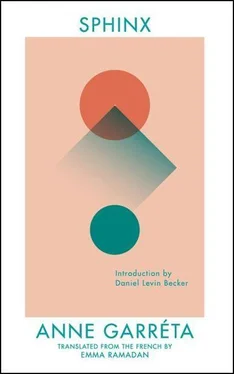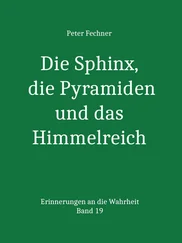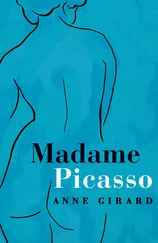Anne Garreta - Sphinx
Здесь есть возможность читать онлайн «Anne Garreta - Sphinx» весь текст электронной книги совершенно бесплатно (целиком полную версию без сокращений). В некоторых случаях можно слушать аудио, скачать через торрент в формате fb2 и присутствует краткое содержание. Год выпуска: 2015, Издательство: Deep Vellum Publishing, Жанр: Современная проза, на английском языке. Описание произведения, (предисловие) а так же отзывы посетителей доступны на портале библиотеки ЛибКат.
- Название:Sphinx
- Автор:
- Издательство:Deep Vellum Publishing
- Жанр:
- Год:2015
- ISBN:нет данных
- Рейтинг книги:3 / 5. Голосов: 1
-
Избранное:Добавить в избранное
- Отзывы:
-
Ваша оценка:
- 60
- 1
- 2
- 3
- 4
- 5
Sphinx: краткое содержание, описание и аннотация
Предлагаем к чтению аннотацию, описание, краткое содержание или предисловие (зависит от того, что написал сам автор книги «Sphinx»). Если вы не нашли необходимую информацию о книге — напишите в комментариях, мы постараемся отыскать её.
is a remarkable linguistic feat and paragon of experimental literature that has never been accomplished before or since in the strictly-gendered French language.
Anne Garréta
Pas un jour Emma Ramadan
Monospace
Sphinx — читать онлайн бесплатно полную книгу (весь текст) целиком
Ниже представлен текст книги, разбитый по страницам. Система сохранения места последней прочитанной страницы, позволяет с удобством читать онлайн бесплатно книгу «Sphinx», без необходимости каждый раз заново искать на чём Вы остановились. Поставьте закладку, и сможете в любой момент перейти на страницу, на которой закончили чтение.
Интервал:
Закладка:
Even now, the taste of sweet potato melts into the taste of iced tea in my mouth. Is there anything more vertiginous than gustative reminiscence? For it upends completely the conventional workings of memory. When I recall this meal, something appears without being summoned, something that does not serve as a witness to anything, that does not help me to follow the thread of my memory. But this something returns — not under the guise of a phantom, of an immaterial representation of an object now vanished, of a perception swallowed up and designated to a bygone past, coming from the imagination to reincarnate itself feebly in the present. Instead, it crystallizes, taking on an intense, fugitive form, a carnal presence — the rebirth of a sensation whose former source has long ago disappeared. A vivid hallucination, a tangible reliving that invades the mouth and spreads down the back of the throat, taking on body, flesh, and warmth: the flavor itself, still intact, of this long-gone nourishment.
Then the taste that surfaced on my tongue is erased, mutated in the caress of this persistent flavor that I feel melt and travel to the bottom of my throat. Even as the pure gustatory reminiscence that surged up in me at the evocation of tea and sweet potatoes fades and dissolves, the sensation of gooiness comes back to me: those melting granules that coat the epithelium as far back as the glottis in a soft, thick veil, as would honey. I silently revel in this sweetness descending in me, fearing that with words I might tear the surface of this veil, both fragile and protective, like a second skin.
My English still bears the stigmata from the time spent among an almost exclusively black community. Imperceptibly, the expressions and characteristic improprieties of their speech slipped into the tissue of the academic English I had been taught in high school. The language I speak is a monstrous hybrid, mingling Oxford and Harlem, Byron and gospel. To the point of caricature, I pronounce these African American utterances with a rather British accent, and sometimes swallow up to half of the syllables of a too perfectly constructed sentence.

I begged A***, who was strongly repelled by the idea, to take me on a walk through Harlem. My wish was finally granted after several entreaties. One afternoon, we went up the main avenue of Harlem on foot, from Central Park up to 125 thStreet. I exalted in the view of these neighborhoods whose ruin and incredible devastation reminded me, in places, of Berlin: the vestiges of a past splendor, as if swept away by a brutal disaster. People congregated in doorways, busy conducting transactions, and watched us pass out of the corner of their eyes, indifferent. In a run-down building with neither doors nor windows and open to gusts of winter wind, vagrants had lit a brazier to heat their hands over the flames. The snow shoveled into heaps on the sidewalks was turning into ice now that the sun had begun to sink behind the towers of lower Manhattan. We walked slowly; after 110 thStreet we no longer saw a single white person, nor even a Puerto Rican. Like all who have left Harlem, it repulsed A*** to be back, even temporarily, so disconcerting was the spectacle of abandon and misery plastered on the fronts of buildings. The day was dimming. The more we walked into the heart of this city, the heavier and more pressing was the feeling of affliction. Shadow was eroding the facades, riddled with the holes of what were once windows. Desolation was spread uniformly over this inordinate expanse; the excessive degradation would have been heartrending even for those who tend to savor macabre spectacles. Harlem projected the muffled but poignant impression of the end of the world. This vision haunted me for a long time. I felt as though there, amidst all the abandonment, I had abandoned something of myself, snatched away without my realizing it in the moment and subsequently forever out of reach. I wasn’t able to close the wound that had been opened by this cleaving of my own flesh.
The effect of this sundering has never left me; sometimes I am forced to relive certain moments all over again, vivid and uncorrupted, when, digressing at random, my thoughts bring old memories back to me. An anxiety wells up and distills in me, the feeling of having lost, of having let this setting swallow up, a fragment of my substance that I can’t place or describe, but whose absence makes itself felt throughout my body, invading and voiding it insidiously. A bitter cold, an abyss full of wind cuts through me, the same wind that cut through me as I walked through the streets of Harlem all those years ago. Harlem’s devastation now resides in me, my body haunted by the soul of this spectral city. It’s a dead body that I carry, lodged in the depths of my own, which is at the brink of death as a result. And Harlem retains something of me, too; I still have visions of this loss. I am forced to remember this place’s existence because of this theft, its resurgence in my memory, the sorrow I feel but cannot define; it doesn’t want to leave me, it refuses to close the door on its misery, instead poisoning the vague wave of my thoughts, invading me, stripping me, emptying me of all that is not it, taking possession of my body, staking itself and taking refuge, overwhelming the physical limits of time and distance, absorbing me into itself, turning my body into that city, that abandonment, that devastation.
When we returned from America, I resumed my position behind the turntables at the Apocryphe, but only on Thursdays, Fridays, and Saturdays — the nights with the biggest crowds. I had resolved to resume my studies and to devote my four days off per week to analyzing metaphysical texts in order to write an essay on the apophatic tradition.
For too long I had neglected a regular intellectual practice because it had been incompatible with the new mind-numbing nocturnal life to which I had made myself prisoner. I became aware of these constraints and of their consequences once I had had a vacation from them, a pause that suspended the chain of overindulgent nights. It made me realize the bleak inanity of the time I had lost squandering my life in the night, devoting myself exclusively to venal pleasures.
The Eden had closed — momentarily, so they said — and A***, with neither work nor guaranteed income, moved in with me. Living together seemed only natural following a month of vacation without any drama, and the vastness of my apartment spared us from sharing any awkward propinquity.
The airy, sweet closeness was not, however, without tension, brought on by the radical difference in our lifestyles. All day we stayed in the house, barely leaving; but while I withdrew to my study to read in peace, A*** would spend most days in front of the television screen watching shows and films, despite my attempts to suggest a less passive pastime. No book or work of art was enticing enough to evoke curiosity. A***’s sole activity was a daily exercise routine to maintain good physical form and bodily suppleness. At the end of each week, we would have dinner together at a restaurant before heading to the Apocryphe, or, when A*** felt the desire (more and more frequently) to meet up with some friends, we would separate at the door of the club, where I would carry out my night’s work.
In April I took a three-month vacation, which we spent visiting some cities in Europe before continuing on to New York. Venice, Florence, Rome, Munich, Heidelberg, Berlin, Amsterdam, and London: we made a tour of these cities over the course of May and June without spending more than a week in any of them. In the space of a few days, I would visit the museums that I knew had some paintings (by Mantegna in particular) or collections I was hoping to see. I also visited a few universities where I had friends who introduced me to the professors there who might be interested in my research. They were all very welcoming and encouraged me to pursue my studies.
Читать дальшеИнтервал:
Закладка:
Похожие книги на «Sphinx»
Представляем Вашему вниманию похожие книги на «Sphinx» списком для выбора. Мы отобрали схожую по названию и смыслу литературу в надежде предоставить читателям больше вариантов отыскать новые, интересные, ещё непрочитанные произведения.
Обсуждение, отзывы о книге «Sphinx» и просто собственные мнения читателей. Оставьте ваши комментарии, напишите, что Вы думаете о произведении, его смысле или главных героях. Укажите что конкретно понравилось, а что нет, и почему Вы так считаете.












